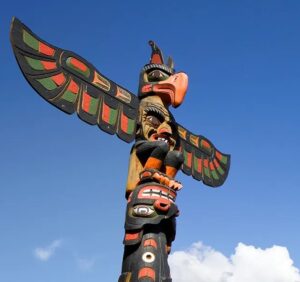 It took 100 years, but Jim Wallahee’s illegal hunting conviction was finally reversed.
It took 100 years, but Jim Wallahee’s illegal hunting conviction was finally reversed.
The Washington Supreme Court ruled on May 16, 2024, that he had a treaty right to shoot that deer. (See story here and court decision here.)
When Europeans began settling in North America, they exercised what the U.S. Supreme Court described in 1823 as discoverer’s rights “to appropriate the lands occupied by the Indians,” who under that doctrine “only retained only a right of occupancy, not ownership” (decision, p.3). A frail “right” it was, because the “Indians” were pushed out again and again; the Doctrine of Discovery in reality is colonizers taking whatever they want.
The Washington court says the idea originated with 15th century papal decrees proclaiming Christians had a divine right to seize land from non-Christians (footnote 1 at p.2), laying the groundwork for the centuries of colonial abuses that followed. (Still want to believe the Church always spoke infallibly for a loving Creator who endows all people with inalienable rights?) The basic premise was that if you conquer it, it’s yours.
That’s the principle, if you wish to call it such, which Chief Justice Marshall enshrined in American law in 1823. The Vatican finally repudiated it in 2023; the U.S. Supreme Court is still procrastinating (id., p.3), so at this point we can’t say Native Americans own land in the U.S. except in individual capacities like the rest of us. Despite talk of tribal sovereignty, the Indian reservations in various states are federal land. (Tribal sovereignty in reality is Congressional deference to tribal self-government.)
A treaty between the U.S. government and Yakama Nation reserved to the Yakama people a right to fish in their usual and accustomed places and hunt, gather, and pasture livestock on open and unclaimed land (p.4). The Washington court says, “This treaty, and others making similar promises made with other tribes in the area, paved the way for Washington State to exist” (id.).
But as the Washington court acknowledges, those promises were often broken and the Yakamas repeatedly had to enforce their treaty fishing and hunting rights in the courts (id.). Because Wallahee shot the deer on open and unclaimed land, his conviction “ignored a clear treaty right … consistent with a pattern of disregard for the rights of Native people” (p.5).
Why would a court go along with this? The trial judge reasoned the treaty was abrogated at statehood, so the state had no obligation to honor it (p.6). Wallahee appealed but his conviction was upheld in 1927. In 2023 the Washington attorney general called that decision “wrongly decided” (id.). Today’s Washington Supreme Court agreed, saying that ruling came “from the belief that Native Americans lack basic human and equal rights and therefore treaties with them may be disregarded,” and saw “a duty to explicitly repudiate that belief and to disavow our opinions that reflected that belief” (p.12).
A dissenting opinion argues that while the conviction was wrongful, Wallahee’s estate lacks standing to contest it, and the court lacks authority to overturn it on its own. These are procedural issues that lawyers can debate. The majority opinion paints with a broad brush, talking about righting historic wrongs, and essentially daring the U.S. Supreme Court to purge from American law the “Doctrine of Discovery” that led to so much human misery in the world.